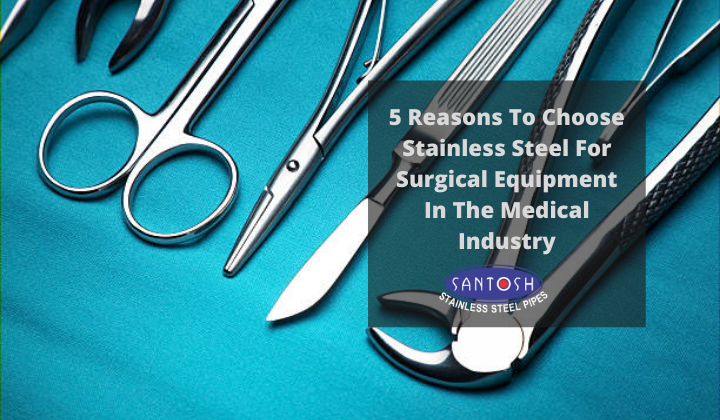
The medical world heavily relies on precision and the right care. Purchasing medical equipment is an important investment decision. You not only invest in patients’ safety but also in their trust in you as a doctor. Inadequate material may become a reason for the wrong diagnosis, infection, or inaccuracy in the result. It is evident to invest in surgical steel equipment that is scientifically proven to be safe and medically tested. Isn’t it astonishing that the material that builds giant stainless steel pipes and stainless steel tubes used in power plants and the chemical industry is the same alloy that makes surgical equipment, especially orthopedic equipment? Let's cut to the case and find the reason to choose stainless steel alloys for medical equipment.
Stainless steel grades for surgical steel instruments
Stainless steel (also known as inox steel) is one of the most common metal alloys used in the manufacturing of surgical instruments.
Austenitic 316 steel, also known as "surgical steel," is a form of stainless steel that is commonly used in medical instruments. This is because it is a sturdy and corrosion-resistant metal. The most widely utilised metal for medical instruments is AISI 301. When cold-worked, it enhances mechanical properties but loses corrosion resistance.
Because stainless steel can resist temperatures of up to 400°C, it can be sterilised in an autoclave at 180°C with ease. It also has the advantage of being almost as strong and durable as carbon steel. These five reasons, we feel, explain why medical sectors trust stainless steel metal for surgical tools.
1. Able to Withstand High Temperature
Because of the sterilisation process, the surgical instruments go through high temperatures. The method of sterilisation includes scolding hot steam at 121 degrees for at least half an hour. As mentioned earlier, stainless steel can withstand more than 400 degrees Celsius temperature. Experts suggest changing the dimension of the instrument after repeated sterilisation in order to function smoothly.
2. Maintenance
Doctors and surgeons need an instrument that is precise in every operation. Wear and tear depletes the effectiveness of the instrument, which may end up affecting the patient. Consequently, stainless steel is a long-lasting alloy that carries low chances of wear & tear.
3. Corrosion and Heat Resistant
Surgical instruments are regularly in contact with bodily fluids such as pus and blood. These fluids contain chloride, which corrodes the instrument quickly. Well, having stainless steel instruments becomes a savior in such situations. These instruments are likely to get washed to remove bodily fluids from them. Thus, water may contain certain minerals that can cause stains and corrosion. Here, titanium and steel-made instruments work like a charm and provide durability and low maintenance.
4. Biocompatibility
Biocompatibility describes a material’s compatibility with living tissue. So if the material is biocompatible, it doesn't react when exposed to bodily fluids. Having 10% chromium in steel gives the guarantee of not reacting to toxic or allergic substances.
5. Fracture fixation
Stainless steel alloys are far tougher than bone and have a long history of being durable enough to allow recovery. Furthermore, due to the smooth surface created by electropolishing, stainless steel is relatively affordable and biologically well-tolerated. It also has the benefit of being flexible enough to allow plate shaping without cracking. In most fracture types and anatomic locations, electro-polished stainless steel has a strong clinical track record.
The Bottom Line
There are other metals considered to be effective in the usage of medical instruments, such as titanium, platinum, palladium, and stainless steel. The application of surgical instruments is critical; hence, the metal used in manufacturing should be easy to clean, corrosion-resistant, wear-and-tear-proof, compatible with bodily fluids, and lastly, a tougher metal that supports bone in fracture. Besides ticking all the boxes, stainless steel is a durable, easily available, and cost-effective option compared to other metals. Being a versatile metal, stainless steel finds its uses in other industries as well. Such as power plants, chemicals, nuclear, and pharmaceuticals. Santosh Steel & Pipes India Pvt. Ltd. is a renowned manufacturer of stainless steel pipes and stainless steel tubes in India. We have been catering to industries like automobiles, sugar mills, petrochemicals, stainless steel in power plants, and oil & gas. Feel free to contact us and visit our website to order the finest quality steel products.